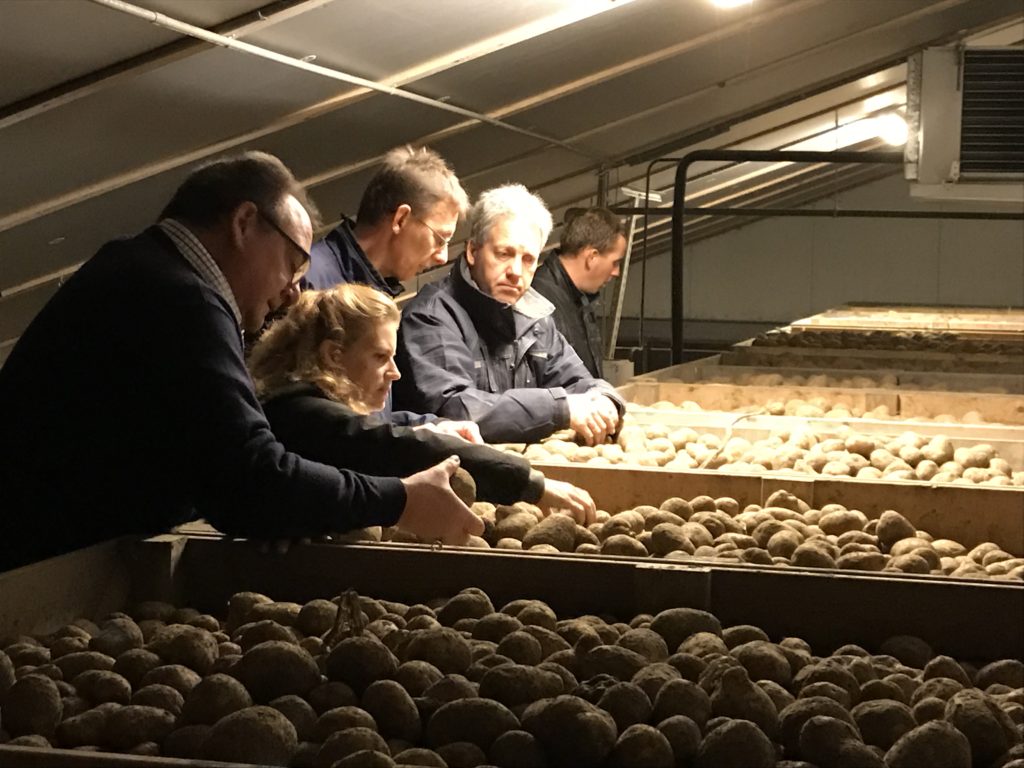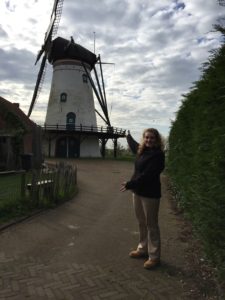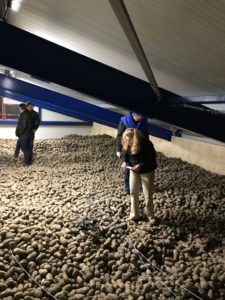
Inaugural Spudwoman of the Year offers words of wisdom
Last year Addie Waxman became Spudman’s inaugural Spudwoman of the Year. When we first talked to her she had graduated from the University of Idaho with her Ph.D. in plant sciences and was director of research and development for 1,4GROUP in Meridian, Idaho, which develops dormancy and sprout inhibiting products for the potato storage industry.
Since then, Waxman was promoted to global director of research and development. As part of that role, earlier this year she took an extended tour of Belgium, France, the Netherlands and Scotland.
“It’s been so exciting,” she said. “I was probably in 20 sheds, at least, in various countries.”
She was doing on-farm visits related to 1,4GROUP’s chlorpropham-free (or CIPC -free) sprout and peep control product 1,4SIGHT. While on the trip, she received the news that the company had received a product registration in Germany.
Waxman has always been involved in agriculture, from working on the family dairy farm to her first jobs.

“I think I’ve always been working in it,” she said.
When she began her college course work, she made the conscious choice to only take agriculture jobs.
“I preferred to work in the dairy barn or entomology lab as opposed the cafeteria,” Waxman said.
Since starting in a microbiology lab monitoring the activity levels of yeast, she’s achieved great success. Spudman caught up with her a year after she won the title of Spudwoman of the Year and asked her about her views on starting and growing a successful career as well as her views on the industry in general.
SPUDMAN: What advice would you have given to a younger you, to the Addie Waxman who was just starting out?
Addie Waxman: I would say take as many internships as you possibly could, on campus and also during the summer. Beef up that resume with real-life job experience and go into different areas as well. Don’t just think, “I’m in this major so I have to stick to internships in this specific area.” College is a time to really try out different interests and swing from entomology to dairy to animal husbandry to plant sciences – try them all. It’s not going to hurt your resume to have a variety in your background and it could help you decide what you want to do later on.
SPUDMAN: Have you had the experience that having a wide knowledge base helps, that unexpected bits of your past have come in handy in your current job?
AW: My bachelor’s degree was in biology and chemistry and my masters was actually in agriculture, but in dairy science. Also, my Ph.D. was in plant science so I have this varied background. I was just in Europe and I was in all of these different farming areas. I was able to connect to a grower by just looking over and saying, “oh my gosh, you’ve got dairy cows.” Just taking an interest – he lights up and asks, “do you want to see them?”
It’s a different way for me to relate to a grower, so instead of just showing up as someone trying to sell chemicals, I’m actually someone who’s taking a deep interest in his operation.
As someone who’s worked their way up through the ranks, do you have any advice for folks who’ve established a career but are not quite on your level yet?
AW: Get involved, absolutely join the organizations. Join the Potato Association of America. If the Idaho Potato Commission is putting on the Potato Bowl, volunteer, be down there helping people get seated. You should become known in the industry, plus take a look at what interests you. I work in the agricultural chemical industry, so I joined the Biological Products Industry Alliance to help me gain more knowledge about my industry.
Was there any on-the-job advice that you received that helped you in your career as well?
AW: My mentor was Jim Zalewski. He was the director when I came here to 1,4GROUP and he not only was my mentor, he was my friend. His advice to me was: one, to get involved in the industry; two, to become educated in what you are doing and always read. And three, never make big decisions on bad days.

He said your job after hours is to get better at your job. So, he was always reading, reading older books to enhance his foundational knowledge. He always had the American Journal of Potato Research, at least three or four issues, in his bag at all times. He was a life-long learner. He was an example for me that I still follow, I always have a few journals in my backpack that I can read at an airport or on an airplane. You can always pick up something new.
Have there been any developments in the industry that have been interesting to you?
AW: Most definitely is consumer awareness of what they are eating and the entire farm to fork mentality. They want to know where their foods have come from and, in many cases, they want to know the whole journey. It used to just be maybe a sliver of people who were concerned but that number is growing and growing.
I worked for J.R. Simplot Company where I was in food processing, then I moved into agricultural chemistry, so I had to learn how to address fears about chemicals. A lot of people who perhaps don’t have a science background are fearful of the word “chemical” and the word “pesticide.” It’s an instantaneous fear reaction so I have to calmly address their fears.
I usually ask them first, “what are you concerned about?” Then I get an understanding of their background. Where have they been uninformed or misinformed? Then I can address it from a point of view of, “you know I’m a mother, I understand how you might be feeling,” and to approach it from their level. If you are condescending, they’re not going to hear anything that you say. If you put them down, they’ll close up.
How have you seen the industry change during your career?
AW: I see more women entering agriculture. My own daughter is graduating in agriculture from the University of Idaho in May. I’m very proud of her for entering the same field and for being a female in agriculture. But when the average age of a farmer is 58 (according to the 2012 Census of Agriculture) in this country, and when I go to the PAA or the BPIA and I see people in their late 50s as an average age, I grow worried. Where are the young people?
For me overall, I would like to see more young people enter the field. This goes back to high school. I think overall in our country we have removed agriculture as an option for education in high school, so if students go to college they get there and spend their first year getting their basics out of the way, then they learn about agriculture but they’re like, “I’m already two years in this other major, it seems cool but I don’t want to lose time.” It shouldn’t be in their sophomore year in college that they learn about agriculture and that it’s an amazing field to go into. I think they should be learning about it in middle school and high school, and that it’s an option, that you can get a job in agriculture.
MORE: Addie Waxman named 2017 Spudwoman of the Year







